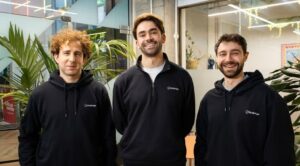Food delivery robot startup Starship Technologies closed a $40 million venture round for its cooler-sized delivery robots but some cities are cracking down on autonomous robot testing amid consumer safety concerns.
If estimates that the robot delivery market could grow to $34 million by 2024 and that 85% of last-mile deliveries will be completed using autonomous vehicles by 2025 are accurate, our city streets and sidewalks could resemble a scene out of Star Wars much sooner than most of us would expect.
One San Francisco-based startup is banking on similar predictions that restaurants and grocers will increase their dependence on convenience-driven digital technologies to meet consumers’ changing needs. Starship Technologies just closed a $40 million venture round led by Morpheus Ventures, bringing its total funding to $85 million. The company co-founders, Ahti Heinla and Janus Friss, founded Skype and launched the new robotics venture in 2014.
The company also announced the start of a pilot program for its cooler-sized robots at the University of Pittsburgh today with plans to launch similar pilots at Purdue University next month. The outfit is hoping to add new universities each month, aiming for 100 campuses under its belt by 2021. It previously piloted a fleet of 25 robots at George Mason University to deliver food to students through their campus meal plans.
Targeting college campuses is a strategic choice on Starship’s part and a likely response to some cities’ and consumers’ growing concern about how residents may react to the sudden influx of relatively untested robots meandering down already crowded sidewalks or rolling into traffic. OpenTable conducted a survey in 2017 revealing that 68% of consumers don’t want to see robots in restaurants, which could cast a foreboding shadow on autonomous delivery robots’ quest for social license.
Many food delivery companies and restaurants see the appeal to autonomous robot delivery, particularly within the immediate geographic range of their businesses, where firing up a car and driving to the consumer’s house or office can take longer than walking.
But how easy is a cooler-sized robot to spot as it rolls its way into a crosswalk or putts down a sidewalk? Cell phone usage while driving already leads to 1.6 million accidents each year, according to the National Safety Council, raising concerns about whether motorists are ready to add small-statured robots to the mix.
Other consumers have concerns about whether a nefarious passerby can tamper with the bot’s contents, either stealing the food delivery inside or tainting the meal. To address this, Starship installed locks and alarms on their bots earlier this year.
Despite the potential safety hazards, startups and delivery companies are going full throttle into the world of chaperone-less bots to do their dirty delivery work.
Postmates debuted its food delivery robot in Los Angeles last year. Named Serve, the yellow and black robot has large black eyes and can carry up to 50-pounds at a time and can travel 30 miles before needing to be charged. The company recently obtained the first permit for autonomous robot testing in San Francisco, which allows the company to run three robots at one time in specific city districts at no more than 3 miles per hour and only during business hours on the weekends. The machines must be accompanied by a human operator who stays within 30 feet of the devices at all times
The city banned autonomous robot pilots from its streets in 2017 and other cities have limited where robots can be tested and how they can be operated.
Fellow Bay Area-based autonomous robot startup Marble has also applied for a permit. It raised a $10 million Series A round last year, describing itself as an industry agnostic “last-mile logistics company.”
“Obviously, there are many cities where it would be much less time- and resource-intensive to get permission to operate, but we love San Francisco and see tremendous potential for robot delivery here,” Marble spokesman Craig Frucht told San Francisco Chronicle in an email.
A number of food retailers are already investing in the concept of people-less delivery solutions with cars, including pizza chain Domino’s, which partnered with Nuro to test driverless pizza delivery in Houston, Texas. DoorDash launched its autonomous food delivery pilot in San Francisco in partnership with Cruise aimed at collecting data about challenges and quality standards. Nuro was testing robots in Arizona and has since moved on in a partnership with Kroger to test more vehicles in the Houston area.





